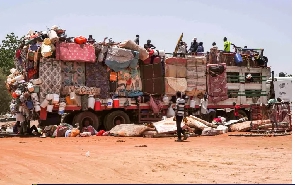 People sit atop a truck carrying household goods parked along the road connecting Khartoum
People sit atop a truck carrying household goods parked along the road connecting Khartoum
As fighting rages on in Sudan, a leading human rights organization has documented what it says are extensive war crimes being carried out by the two parties in the conflict.
In a new report published on Thursday, Amnesty International documented attacks by both the Sudanese Armed Forces (SAF) and the paramilitary Rapid Support Forces (RSF), headed by rivals General Abdel Fattah al-Burhan and Mohamed Hamdan Dagalo respectively, which resulted in heavy civilian casualties.
The attacks, both intentional and indiscriminate in kind, have killed thousands of people since the civil war broke out in April. The four-month conflict has also displaced at least 3.3 million others from their homes.
“Civilians throughout Sudan are suffering unimaginable horror every single day as the Rapid Support Forces and Sudanese Armed Forces recklessly vie for control of territory,” said Agnès Callamard, Amnesty International’s secretary-general.
“The RSF and SAF, as well as their affiliated armed groups, must end their targeting of civilians, and guarantee safe passage for those seeking safety. Urgent steps must be taken to ensure justice and reparations for victims and survivors.”
The report, titled ‘Death Came To Our Home’: War Crimes and Civilian Suffering In Sudan, also details sexual violence against women and girls, deliberate attacks on civilian installations such as hospitals and churches, and widespread looting.
The report – which drew upon interviews with 181 Sudanese refugees, mostly in Chad – concentrates mainly on the capital Khartoum and the West Darfur region, where death and destruction have raised the “spectre of the scorched earth campaign of previous decades”, Callamard said.
Rights groups have reported attacks by the RSF and Arab militias against the non-Arab Masalit people in the region, and the United Nations said the discovery of a mass grave containing the bodies of Masalit victims last month was an indication of the ethnically motivated fighting taking place in the state.
The power struggle between al-Burhan and Dagalo, known by his popular moniker Hemedti, has killed at least 3,000 people, with attacks frequently hitting densely populated civilian areas. People have been shot inside their own homes, or while desperately searching for food, water, and medicine, Callamard said, adding that “nowhere is safe”.
One notable example is the death of Ala’ al-Mardi, a 26-year-old doctor killed in her home in Omdurman’s Hay al-Manara neighbourhood on April 15, the first day that fighting began.
Speaking to Amnesty International, Ala’s father Fawzi said he had been worried about his daughter as she was working in the hospital. When she came home, a bullet came through the living room window, hitting his wife in the face.
“It went through the right side of her face and neck, and then it hit Ala’ in the chest, killing her instantly,” Fawzi said. “That one single bullet destroyed our family in the space of a few seconds… As soon as [Ala’] arrived home, where she should have been safe, death came to our home.”
The rights group has also documented cases where many women and girls – some as young as 12 – were subjected to sexual violence by the warring sides, including rape, which also constitutes a war crime.
In most of the documented cases, survivors said the perpetrators were RSF members or from allied Arab militias.
The SAF and RSF rejected Amnesty’s findings and, while accusing each other of committing violations, they also said in separate responses that they adhered to international law.
“The SAF said it had established a cell to ensure targeting decisions minimized civilian harm, while the RSF denied allegations of sexual violence and said it formed committees to investigate all allegations of misconduct,” the report said. The RSF has also denied involvement in West Darfur.
Amnesty has called on the international community to increase humanitarian support for Sudan, and for neighbouring countries to ensure their borders are open to refugees seeking safety.
It also called on the UN Security Council to “swiftly” extend the arms embargo, which currently applies only to Darfur, to the whole of the country.
“The international community must also immediately extend the existing arms embargo to all of Sudan and ensure its enforcement. Countries with significant leverage over the warring parties must use their influence to end the violations,” Amnesty said.